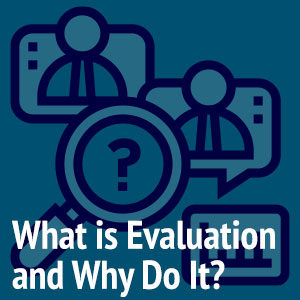 Qualitative research interviews are a critical component of program evaluations. In-person and telephone interviews are especially valuable because they allow the evaluator to participate in direct conversations with program participants, program staff, community members, and other stakeholders. These conversations enable the evaluator to learn in a rich conversational venue about interviewees’ experiences, perspectives, attitudes, and knowledge. Unlike questionnaires and surveys, which typically require structured, categorical responses to standardized written questions so that data can be quantified, qualitative interviews allow for deeper probing of interviewees and the use of clarifying follow-up questions which can surface information that often remains unrevealed in survey/questionnaire formats.
Qualitative research interviews are a critical component of program evaluations. In-person and telephone interviews are especially valuable because they allow the evaluator to participate in direct conversations with program participants, program staff, community members, and other stakeholders. These conversations enable the evaluator to learn in a rich conversational venue about interviewees’ experiences, perspectives, attitudes, and knowledge. Unlike questionnaires and surveys, which typically require structured, categorical responses to standardized written questions so that data can be quantified, qualitative interviews allow for deeper probing of interviewees and the use of clarifying follow-up questions which can surface information that often remains unrevealed in survey/questionnaire formats.
Although research interviews are guided by a pre-determined, written protocol which contains guiding questions, excellent interviews require a nimble and improvisational interviewer who can thoughtfully and swiftly respond to interviewees’ observations and reflections. Qualitative research interviews also require that the interviewer be a skilled listener and thoughtful interpreter of verbally presented data. Interviewers must listen carefully both to the denotative narrative “text” of the interviewee, and to the connotative subtext (the implied intent, tacit sub-themes and connotations) that the interviewee presents.
The most productive qualitative interviews are those that approximate a good conversation. This requires the interviewer to establish a comfortable atmosphere; ask interesting and germane questions; display respect for the interviewee; and create a sense of equality, candor, and reciprocity between the interviewer and the interviewee. Good interviews not only are a source of rich and informative data for the interviewer, they can also be a reflective learning opportunity for the interviewee. Like every good conversation, both parties should benefit. To learn more about our qualitative evaluation methods visit our Data collection & Outcome measurement page.
Resources:
Discussion of interview basics:
http://www.socialresearchmethods.net/kb/intrview.php
Tip Sheet for Qualitative Interviewing:
http://dism.ssri.duke.edu/pdfs/Tipsheet%20-%20Qualitative%20Interviews.pdf
Advantages and disadvantages of different research methods (personal interviews, telephone surveys, mail surveys, etc.):
http://www.jeffandersonconsulting.com/marketing-research.php/survey-research/research-methods
Interviews: An Introduction to Qualitative Research Interviewing, by Steinar Kvale, Sage Publications, Thousand Oaks California, 1996:
http://www.inside-installations.org/OCMT/mydocs/Microsoft%20Word%20-%20Booksummary_Interviews_SMAK_2.pdf
About research interviewing:
https://en.wikipedia.org/wiki/Interview
Interviewing in qualitative research
http://peoplelearn.homestead.com/MEdHOME/QUALITATIVE/Chap15.Interview.pdf
Interviewing in educational research:
http://www.history.ucsb.edu/faculty/marcuse/projects/oralhistory/2006MEBrennerInterviewInEducResearchOCR.pdf



